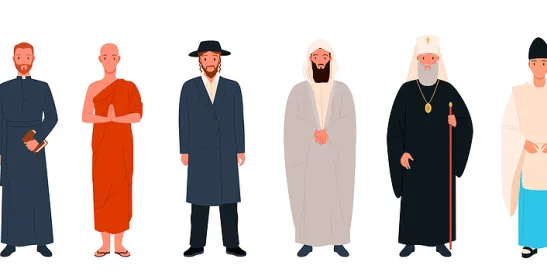On January 7, the United States Court of Appeals for the Fourth Circuit reversed and remanded a district court’s dismissal of a plaintiff’s Title VII religious bias suit—holding the case was sufficient to survive a motion to dismiss at the pleading stage. The matter, Barnett v. Inova Health Care Services, provides key insights and reminders for employers attempting to balance workplace policies with employees’ religious beliefs.
The matter concerned Inova’s COVID-19 vaccine policy. Inova’s policy mandated all employees receive the COVID-19 vaccine unless they had a religious or medical exemption. Barnett, the plaintiff, was a registered nurse and devout Christian. Inova first rolled out its COVID vaccine policy in 2021. At that time, Barnett requested a medical exemption based on lactation concerns but also objected on religious grounds. Inova granted Barnett’s exemption request. According to Barnett, later that year Inova revised its policy and required all employees with an existing vaccine exemption reapply under the new criteria. Barnett claims Inova then required all employees requesting a religious exception complete a questionnaire about their particular religious beliefs applicable to the COVID vaccine. The questionnaire—which Barnett attached to her lawsuit—requested the following information:
1. Describe the nature of your objection to the vaccine.
2. How would complying with the mandate burden your religious exercise?
3. How long have you held the religious belief forming the basis of your objection?
4. As an adult have you received any other vaccines?
5. If you do not religiously object to other vaccines, why do you object to the COVID vaccine?
6. Identify other medications/products you avoid because of your religious beliefs.
When completing the questionnaire, Barnett sought only a religious exemption. Therein, Barnett explained she was a devout Christian and made “life decisions after thoughtful prayer and Biblical guidance.” Barnett further claimed it “would be sinful for her” to take the vaccination having been “instructed by God” to abstain from it. Additionally, Barnett alleged that receiving the vaccine would be “sinning against her body.” Barnett’s stance on the vaccine did not arise directly from scripture but, instead, was “based on her study and understanding of the Bible and personally directed by God.” Inova ultimately denied Barnett’s exemption request—and discharged Barnett after briefly placing her on administrative leave.
According to Barnett, Inova effectively picked “winners and losers” from among those employees requesting an exemption. More particularly, Barnett claimed that Inova chose to exempt employees from more “prominent” or “conventional” religions, while denying Barnett’s request. Barnett claimed to practice a non-denominational form of Christianity.
In her lawsuit, Barnett brought one count of failure to accommodate and two counts of disparate treatment pursuant to Title VII of the Civil Rights Act. Barnett also brought overlapping state-law claims under the Virginia Human Rights Act.
Inova moved to dismiss Barnett’s complaint pursuant to Federal Rule 12 on the basis it failed to state a viable claim for relief. Primarily, Inova argued that Barnett’s concerns about the COVID vaccine were not sincerely religious in nature and, rather, amounted to personal preferences or fears. Inova claimed that Barnett’s reliance on “prayerful consideration” to make her vaccination decision—instead of scriptural authority—meant her choice was “untethered to a particular religious belief.” The district court sided with Inova and dismissed Barnett’s complaint on the pleadings. Barnett appealed that decision to the Fourth Circuit.
On appeal, the Fourth Circuit reversed and remanded the district court’s decision; wholly reinstating Barnett’s lawsuit. In its opinion, the Court of Appeals noted that to qualify for Title VII protection, a religious discrimination plaintiff must show her professed belief is (1) sincerely held and (2) religious in nature. The Fourth Circuit found Barnett met the first prong by alleging to be “a sincere follower of the Christian faith” who made “all life decisions” after “prayer and Biblical guidance.” Sincerity, the Court of Appeals noted, is “almost exclusively a credibility assessment” that can “rarely be determined on summary judgment, let alone a motion to dismiss.”
The Fourth Circuit also found Barnett’s complaint adequately demonstrated her beliefs were religious. In her lawsuit, Barnett alleged that getting the COVID vaccine would be “sinful…against her body”, defy instructions “by God”, and otherwise go against her “study and understanding of the Bible.” According to the Fourth Circuit, these allegations were “sufficient to show that Barnett’s belief is an essential part of a religious faith” and “plausibly connected” to her refusal to receive the COVID vaccine.
The Barnett opinion offers some important lessons. First, Rule 12 motions to dismiss are difficult to win, give plaintiffs a low bar to clear, and should be filed only when strategically appropriate; not as a matter of course. To survive a Rule 12 motion, a complaint need only plead facts that—taken as true—plausibly support a claim. In the context of discrimination suits, the Fourth Circuit noted that allegations offering a “reasonable inference” of discriminatory intent are sufficient. A plaintiff also does not need to establish a prima facie case to survive a Rule 12 motion. As the Fourth Circuit remarked, that is an “evidentiary standard, not a pleading requirement”.
Second, Barnett serves as a reminder that a religious belief need not be rooted in scriptural authority or dogma to form a viable discrimination claim. Similarly, a plaintiff’s theological interpretations need not be shared by their church’s leadership—or deemed valid by their employer—to qualify as religious in nature.
Third, at the pleading stage especially, courts give a wide berth to a plaintiff’s claim that their religious belief is “sincerely held.” As the Barnett court noted, whether a plaintiff’s religious belief is “sincere” is a credibility assessment that can rarely—if ever—be determined on the pleadings.
Fourth and finally, Barnett serves as a reminder that employers should consult experienced counsel before implementing any policies, procedures, or written questionnaires designed to evaluate whether employees may qualify for an exemption from vaccines or other workplace mandates. The plaintiff in Barnett attached Inova’s questionnaire as an exhibit to the publicly-filed complaint. Any business implementing these or other policies should seek advice from well-qualified outside counsel.




 />i
/>i

